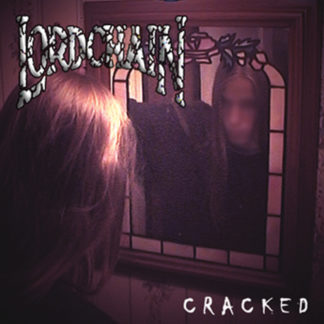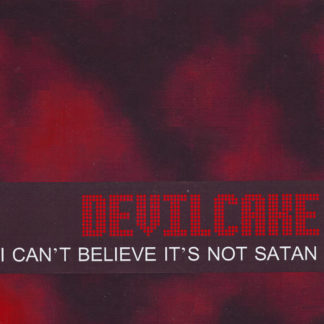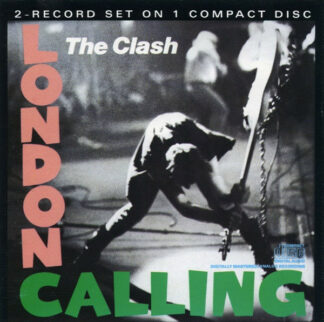Description
London Calling is the third studio album by the English rock band the Clash. It was originally released in the United Kingdom on 14 December 1979 by CBS Records, and in the United States in January 1980 by Epic Records.
The Clash recorded the album with producer Guy Stevens at Wessex Sound Studios in London over a five- to six-week period starting in August 1979, following a change in management and a period of writer’s block for songwriters Joe Strummer and Mick Jones. Bridging a traditional punk rock sound and a new wave aesthetic, London Calling reflects the band’s growing interest in styles beyond their punk roots, including reggae, rockabilly, ska, New Orleans R&B, pop, lounge jazz, and hard rock. Lyrical themes include social displacement, unemployment, racial conflict, drug use, and the responsibilities of adulthood.
The album was a top ten chart success in the UK, and its lead single “London Calling” was a top 20 single. The album has sold over five million copies worldwide, and was certified platinum in the US for sales of one million. It was also met with widespread critical acclaim and has retrospectively been named one of the greatest albums of all time. On Rolling Stone’s list of the 500 Greatest Albums of All Time, London Calling was ranked number 8.

The Clash – London Calling
Label: Epic – EGK 36328
Series: The Nice Price Plus
Format: CD, Album, Reissue, Repress
Country: US
Genre: Rock
Style: Punk rock
1 London Calling
Written-By – J. Strummer*, M. Jones*
2 Brand New Cadillac
Written-By – V. Taylor*
3 Jimmy Jazz
Written-By – J. Strummer*, M. Jones*
4 Hateful
Written-By – J. Strummer*, M. Jones*
5 Rudie Can’t Fail
Written-By – J. Strummer*, M. Jones*
6 Spanish Bombs
Written-By – J. Strummer*, M. Jones*
7 The Right Profile
Written-By – J. Strummer*, M. Jones*
8 Lost In The Supermarket
Written-By – J. Strummer*, M. Jones*
9 Clampdown
Written-By – J. Strummer*, M. Jones*
10 The Guns Of Brixton
Written-By – P. Simonon*
11 Wrong ‘Em Boyo
Written-By – C. Alphanso*
12 Death Or Glory
Written-By – J. Strummer*, M. Jones*
13 Koka Kola
Written-By – J. Strummer*, M. Jones*
14 The Card Cheat
Written-By – J. Strummer*, M. Jones*
15 Lover’s Rock
Written-By – J. Strummer*, M. Jones*
16 Four Horsemen
Written-By – J. Strummer*, M. Jones*
17 I’m Not Down
Written-By – J. Strummer*, M. Jones*
18 Revolution Rock
Written-By – D. Ray*, J. Edwards*
19 Train In Vain
Written-By – J. Strummer*, M. Jones*
Manufactured By – Epic Records
Manufactured By – CBS Inc.
Copyright © – CBS Inc.
Phonographic Copyright ℗ – CBS Inc.
Phonographic Copyright ℗ – CBS Records
Bass, Vocals – Paul Simonon
Drums, Percussion – Topper Headon
Guitar [Guitars], Vocals – Mick Jones
Vocals, Rhythm Guitar – Joe Strummer
Similar to The Clash – London Calling, but with mastering and mould SID codes, indicating a release of 1994 or later.
“2-Record Set on 1 Compact Disc” in a black band on top of front image.
“The Nice Price Plus 4014S1” discount series sticker on jewel case.
Track 19 “Train In Vain” not printed on tray card & booklet.
ⓟ1979 CBS Inc. on disc
©1979 CBS Inc./ⓟ1979 CBS Records/Manufactured by Epic Records/CBS Inc. on inlay and tray card.
Printed in U.S.A.
Barcode: 0 7464-36328-2
Matrix / Runout: DIDP-070252 08
Mastering SID Code: IFPI L336
Mould SID Code: IFPI 5100
Other (DADC “Sony Popular” Code on disc face): DIDP 070252
Writing and recording:
The Clash wrote and recorded demos at Vanilla Studios, with Mick Jones composing and arranging much of the music and Joe Strummer writing most of the lyrics. Strummer wrote “Lost in the Supermarket” after imagining Jones’ childhood growing up in a basement with his mother and grandmother. “The Guns of Brixton” was the first of bassist Paul Simonon’s compositions the band would record for an album, and the first to have him sing lead. Simonon was originally doubtful about its lyrics, which discuss an individual’s paranoid outlook on life, but was encouraged by Strummer to continue working on it.[21]
In August 1979, the band entered Wessex Studios to begin recording London Calling. The Clash asked Guy Stevens to produce the album, much to the dismay of CBS Records. Stevens had alcohol and drug problems and his production methods were unconventional. During a recording session he swung a ladder and upturned chairs – apparently to create a rock & roll atmosphere. The Clash, especially Simonon, got along well with Stevens, and found Stevens’ work to be very helpful and productive to both Simonon’s playing and their recording as a band. The album was recorded during a five- to six-week period involving 18-hour days, with many songs recorded in one or two takes.
The first track recorded for London Calling was “Brand New Cadillac”, which the Clash had originally used as a warm-up song before recording. “Clampdown” began as an instrumental track called “Working and Waiting”. While working on “The Card Cheat”, the band recorded each part twice to create a “sound as big as possible”.
&Musical style
London Calling is regarded by music critic Mark Kidel as the first post-punk double album, as it exhibits a broader range of musical styles than the Clash’s previous records. Stephen Thomas Erlewine said the album appropriated the “punk aesthetic into rock & roll mythology and roots music”, while incorporating a wider range of styles such as punk, reggae, rockabilly, ska, New Orleans R&B, pop, lounge jazz, and hard rock. “Brand New Cadillac”, the album’s second track, was written and originally recorded by Vince Taylor and was cited by the Clash as “one of the first British rock’n’roll records”. The fifth song, “Rudie Can’t Fail” features a horn section and mixes elements of pop, soul, and reggae music together.
The Clash’s embrace of specific musical traditions for London Calling deviated from what Greg Kot viewed as punk’s iconoclastic sensibilities. Speaking on the album, Jack Sargeant remarked that “whether the Clash completely abandoned their punk roots or pushed punk’s musical eclecticism and diversity into new terrain remains a controversial issue.” According to rock historian Charles T. Brown, the album led to the band’s association with new wave music, while music academic James E. Perone considers the album “new wave rock”







![LOST PROPHETS: Thefakesoundofprogress CD [Gold album in the UK, Nu Metal success]](https://yperano.com/wp-content/uploads/2016/03/18024-LOST-PROPHETS-Thefakesoundofprogress-CD-Gold-album-in-the-UK-Nu-Metal-success.jpg)




